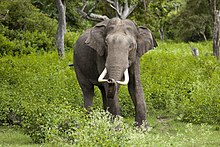Elephantidae
| Elephantidae Temporal range: Pliocene–Holocene |
|
|---|---|
 |
|
| A male Asian elephant (Elephas maximus) in the wild at Bandipur National Park in India | |
| Scientific classification | |
| Kingdom: | Animalia |
| Phylum: | Chordata |
| Clade: | Synapsida |
| Class: | Mammalia |
| Order: | Proboscidea |
| Superfamily: | Elephantoidea |
| Family: |
Elephantidae Gray, 1821 |
| Type species | |
|
Elephas maximus Linnaeus, 1758 |
|
| Subgroups | |
Elephantidae is a family of large, herbivorous mammals collectively called elephants and mammoths. These are terrestrial large mammals with a snout modified into a trunk and teeth modified into tusks. Most genera and species in the family are extinct. Only two genera, Loxodonta (African elephants) and Elephas (Asiatic elephants), are living.
The family was first described by John Edward Gray in 1821, and later assigned to taxonomic ranks within the order Proboscidea. Elephantidae have also been revised by various authors to include or exclude other extinct proboscidean genera.
The family diverged from a common ancestor of the mastodons of Mammutidae. The classification of proboscideans is unstable and has been frequently revised.
The following cladogram shows the placement of the genus Mammuthus among other proboscideans, based on hyoid characteristics:
Loxodonta (African elephants)![]()
...
Wikipedia
